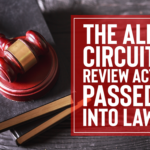The United States Supreme Court will hear arguments in State Farm v. United States, a decade-old False Claims Act (FCA) case relating to alleged fraud carried out in the aftermath of Hurricane Katrina in 2005. The court’s decision should bring clarity to the question of what happens when an FCA plaintiff shares allegations about the defendant to third parties. Currently, federal circuit courts have reached different results on whether a plaintiff’s FCA claim should be dismissed when the allegations are shared with the media and others.
The Case Against State Farm
Two insurance adjustors originally brought an FCA claim against the insurance company State Farm back in 2006 after they witnessed widespread fraud carried out by State Farm while responding to insurance claims from homeowners who had lost their homes in Hurricane Katrina in 2005. The adjustors alleged that State Farm repeatedly and systematically classified home damage as being caused by flooding when the damage was actually caused by wind in order to avoid paying on wind insurance policies and push insurance liability onto the federal government under federal flood insurance programs.
Thus, the adjustors alleged that State Farm caused false claims to be filed with the federal government via the false flood insurance claims. At trial, the jury agreed with the adjustors who brought the claim and the court awarded them with a whistleblower reward of $227,475 as well as nearly $3 million in legal fees and expenses.
Violation of the “Under Seal” Requirement
The issue before the Supreme Court, however, is not specifically the validity of the adjustors’ FCA claims but rather whether their violation of the “under seal” requirement of an FCA claim should warrant the dismissal of their case. FCA claims are required to be filed “in camera” (meaning filed with the court without serving the other party) and remain under seal until the court orders that they be served on the defendant. The under seal requirement gives the federal government time to investigate the claims on its own without the defendant being made aware.
In the State Farm case, the plaintiffs’ lawyer went public with the FCA claims by sending documents from the case to the news media and to a Congressman who read some of the claims into the Congressional Record. State Farm argues on appeal to the Supreme Court that, by violating the under seal requirement, the plaintiffs unfairly prejudiced their ability to defend themselves and thus the FCA case should have been dismissed.
Courts are Split on Whether to Dismiss
The Fifth Circuit agreed with the plaintiffs that the violation of the under seal requirement did not automatically require dismissal. The court reasoned that the purpose of the seal requirement was to assist the government in investigating the claims and not to protect the interests of the defendant in the case, and that, furthermore, nothing in the language of the FCA indicates that dismissal is the proper remedy for a violation of the under seal requirement.
The Fifth Circuit’s decision is in contrast to the Sixth Circuit’s ruling on a similar matter, where that court said automatic dismissal is required. The Ninth Circuit has also weighed in, ruling that dismissal is not automatic under such circumstances. The United States Supreme Court will weigh in and resolve this split when it rules on State Farm’s appeal in the coming term.
Work With Trusted Counsel in Bringing Your FCA Claim
Regardless of how the Supreme Court rules, the State Farm case is an important reminder that FCA claims must be brought pursuant to the proper procedures, and failure to do so can jeopardize a whistleblower’s chances of recovering an award. At Kreindler & Associates, we assist potential whistleblowers in coming forward with evidence of all kinds of fraud. If you have suspicions of wrongdoing that you are contemplating disclosing, contact us today for a consultation on your rights and options as a whistleblower.




